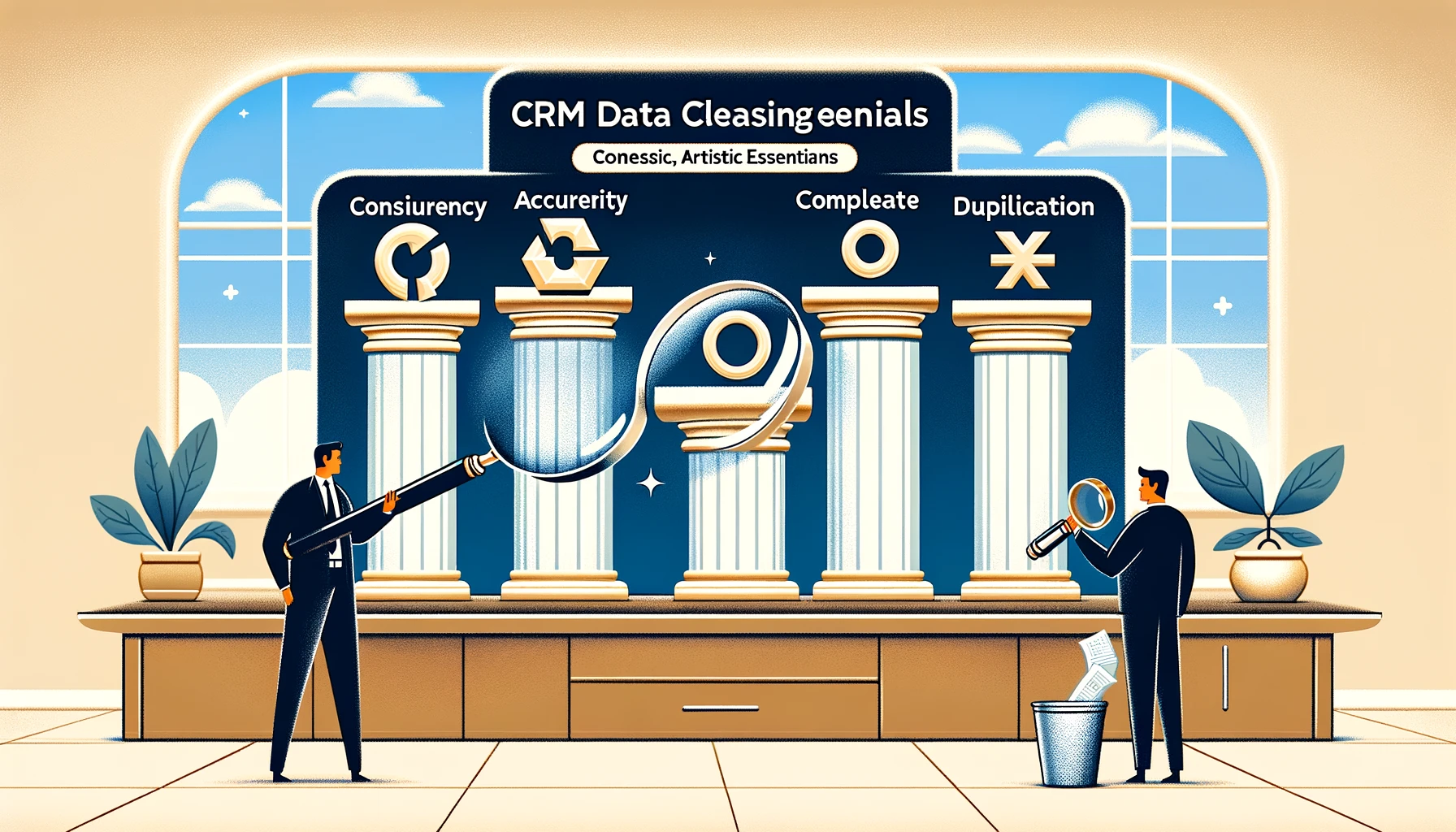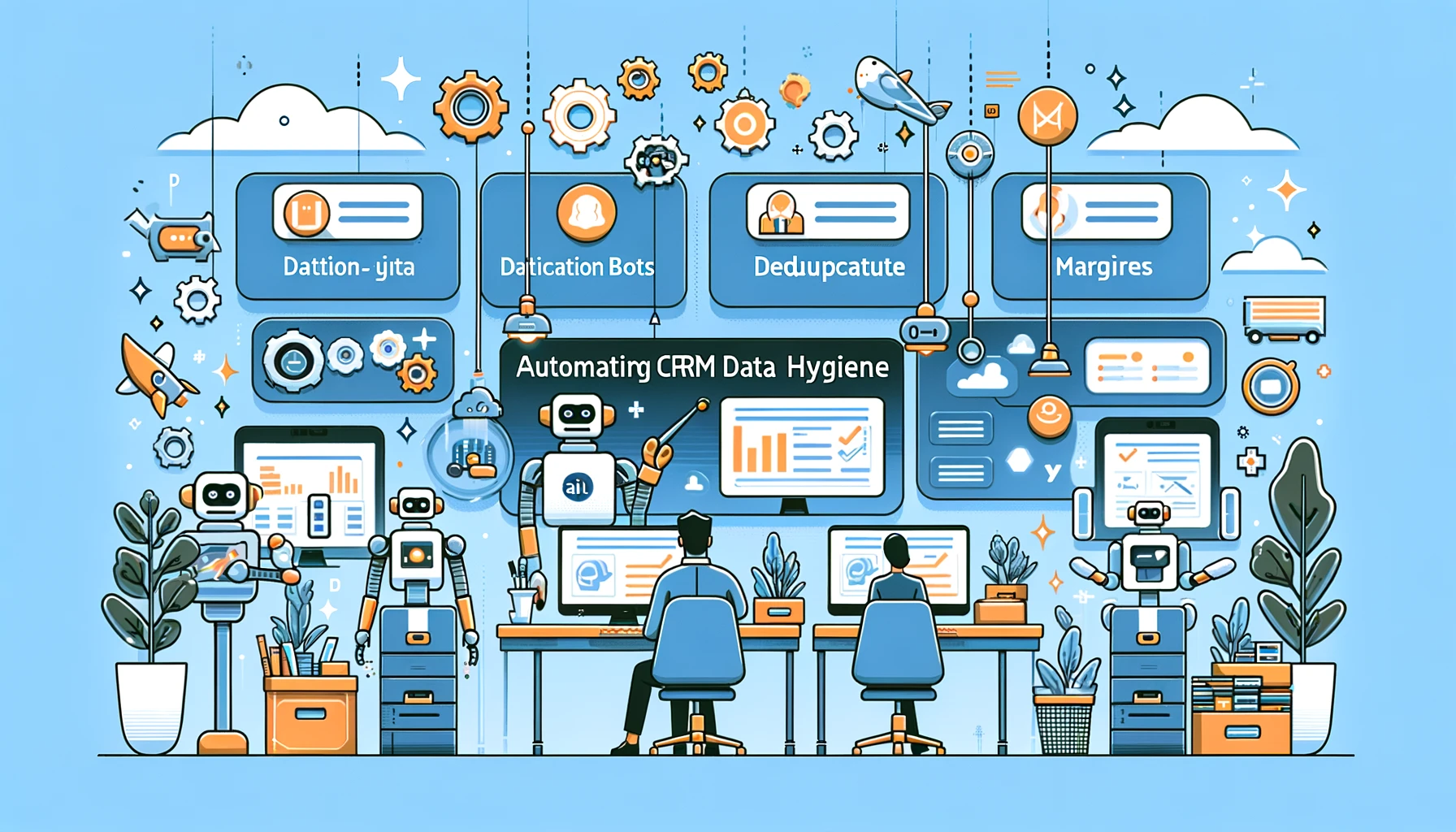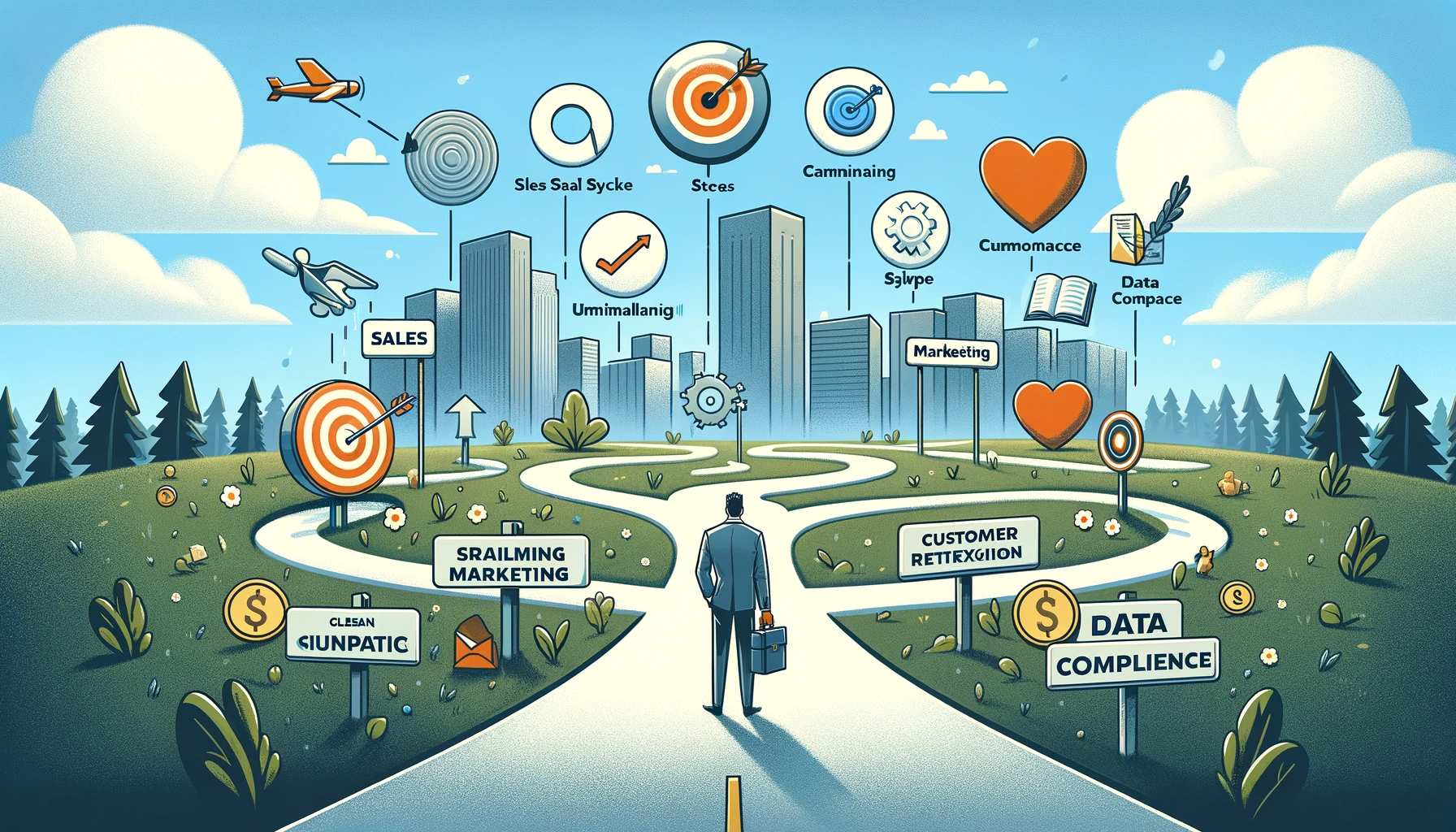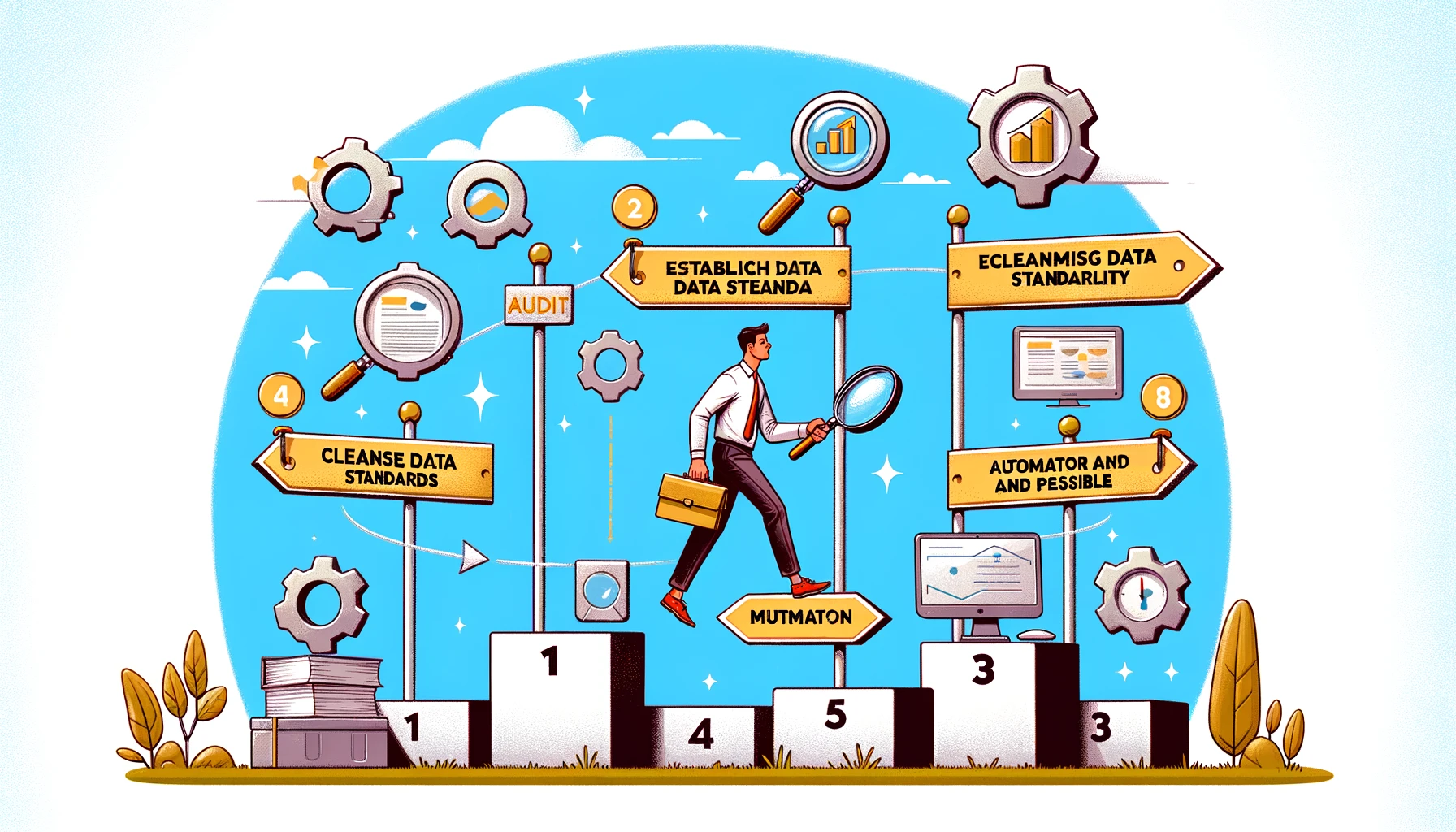Data Hygiene Essentials: Elevate Your Data Quality for Success
Unlock the secrets to pristine data with our guide on data hygiene, ensuring accuracy and boosting your business's decision-making process.
Part 1. Data Hygiene Essentials: Elevate Your Data Quality for Success
Part 2. Data Hygiene Services: Elevate Your Data Quality and Compliance
Part 3. Data Hygiene Tools: Enhance Your Data Quality and Accuracy
Part 4. Data Hygiene Best Practices: Elevate Your Data Quality Today
Part 5. What is Data Hygiene: Essential Practices for Data Quality
Understanding CRM Data Hygiene and Its Impact
Effective CRM data hygiene is not just about tidying up records; it’s a strategic advantage for your business. A pristine database powers your customer management, sharpens marketing automation, and fuels CRM for sales initiatives. Imagine the confidence in knowing that every decision you make is backed by accurate, reliable data.
Here’s what you gain with rigorous data cleaning:
- Enhanced Decision-Making: With clean data, your strategies are based on true customer insights.
- Increased Productivity: Your team spends less time sifting through clutter and more time closing deals.
- Improved Customer Relations: Accurate information means personalized interactions, boosting loyalty.
By integrating CRM data hygiene into your routine, you protect your company’s most vital asset—its customer relationships. Let’s explore the transformative effects clean data can have on your business operations and customer satisfaction.

| Benefits of CRM Data Hygiene | Impact on Business |
|---|---|
| Accurate Customer Profiles | Tailored Marketing Strategies |
| Efficient Data Management | Reduced Operational Costs |
| Reliable Reporting | Informed Business Decisions |
Prioritizing CRM data hygiene is not just a good practice; it’s a cornerstone for sustained success.
The Pillars of Effective CRM Data Cleansing
To achieve superior CRM data hygiene, there are foundational steps you must follow. These pillars are essential to ensuring that your CRM system functions at peak performance, providing you with the insights you need to excel in customer engagement and operational efficiency.
Consistency: Establish a uniform format for all your CRM entries. This makes your data easier to analyze and utilize across different business functions.
Accuracy: Regularly verify the correctness of your data. Accuracy in customer information is vital for effective targeting and personalization of services.
Completeness: Fill in the gaps. Incomplete records can skew analytics and lead to missed opportunities. Make sure all necessary fields are populated.
Duplication Removal: Identify and merge duplicate entries. This will not only save space but also prevent confusion and ensure each customer has a single, comprehensive profile.
By adhering to these principles, your business can maintain a database that is both trustworthy and actionable. Remember, clean CRM data is not just about maintaining order; it’s about harnessing the full potential of your CRM for real estate or any other industry-specific CRM system.

Committing to these pillars of CRM data cleansing will elevate the quality of your customer relationship management and empower your business to thrive on data-driven decisions.
Strategies to Automate Your CRM Data Hygiene
Embracing automation is a game-changer for maintaining perfect CRM data hygiene. With the right AI tools for business, you can streamline data cleansing, freeing up your team to focus on growth and customer engagement. Here’s how to integrate automation into your CRM data maintenance:
- Scheduled Cleaning: Set up regular automated sweeps to correct or remove inaccurate data.
- Real-time Updates: Implement tools that instantly validate and update information as it’s entered.
- Alert Systems: Use notifications to prompt immediate action when inconsistencies are detected.
These strategies ensure that your CRM data remains pristine with minimal manual effort, allowing you to consistently deliver top-notch client management. Let’s delve into the tools that make this possible, ensuring your CRM data is always an asset, never a liability.

| Automation Tool | Function | Impact on CRM Data Hygiene |
|---|---|---|
| Data Validation Bots | Verify accuracy | Ensures data reliability |
| Deduplication Software | Merge duplicates | Eliminates redundancies |
| Automated Alerts | Highlight inconsistencies | Promotes immediate correction |
By harnessing these automation strategies, your CRM’s data integrity becomes a stalwart, propelling your business forward with precision and insight.
Real-World Benefits of Maintaining Clean CRM Data
Clean CRM data isn’t just a concept; it’s a catalyst for tangible business growth. By prioritizing CRM data hygiene, you unlock real-world benefits that ripple through every aspect of your operations. Here’s what you can expect:
Streamlined Sales Cycles: Imagine your sales team navigating through a clutter-free CRM system. They identify prospects quicker, close deals faster, and hit targets with ease, thanks to the clarity clean data provides.
Targeted Marketing: With accurate data, your marketing becomes a precision tool. You can craft campaigns that resonate deeply with your audience, elevating engagement and conversion rates significantly.
Customer Retention: An up-to-date CRM means you understand your customers better. This insight allows for personalized experiences that foster loyalty and encourage repeat business.
Compliance and Reputation: Keeping your CRM data clean helps ensure compliance with data protection regulations, safeguarding your reputation and customer trust.
These benefits are not just achievable; they’re within your reach. By maintaining impeccable CRM data hygiene, you’re setting your business up for success and sustainability.

With these compelling advantages, the effort put into CRM data cleansing becomes a strategic investment in your company’s future. The return? A robust, reliable CRM system that drives your business forward.
A Step-by-Step Guide to Improving CRM Data Quality
Elevating your CRM data quality can seem daunting, but it doesn’t have to be. By following a structured approach, you can systematically enhance your data hygiene and reap the rewards of a cleaner CRM system.
Step 1: Audit Your Data
Start by conducting a comprehensive audit to identify areas for improvement. This will give you a clear picture of your data’s current state.
Step 2: Establish Data Standards
Create a set of data entry standards to ensure consistency moving forward. This step is crucial for preventing future data quality issues.
Step 3: Cleanse Existing Data
Use cleansing tools to correct inaccuracies, remove duplicates, and fill in missing information. This will immediately boost your data’s usability.
Step 4: Automate Where Possible
Integrate automation to handle routine data maintenance tasks, reducing the potential for human error.
Step 5: Monitor and Maintain
Regularly review your data quality and make adjustments as needed. This ongoing vigilance is key to sustaining data cleanliness.
By following these steps, you’ll create a solid foundation for your CRM data quality, leading to more insightful business decisions and better customer relationships.

| Step | Description |
|---|---|
| Audit Your Data | Assess the current quality of your CRM data. |
| Establish Data Standards | Set guidelines for data entry and formatting. |
| Cleanse Existing Data | Correct and update your CRM records. |
| Automate Where Possible | Use tools to maintain data hygiene. |
| Monitor and Maintain | Continually check and refine data quality. |
Implementing these steps will not only improve your CRM data quality but also position your business for greater operational efficiency and customer satisfaction.
FAQs
What is CRM data hygiene and why is it important?
CRM data hygiene refers to the process of keeping customer relationship management (CRM) data accurate, up-to-date, and free from duplicates or errors. It's important because clean data ensures that businesses can make informed decisions, effectively manage customer relationships, and maintain high-quality communication and marketing efforts.
How often should CRM data be cleaned?
The frequency of CRM data cleaning can vary depending on the volume of data and how quickly it changes. However, it's generally recommended to perform a thorough cleaning at least once a quarter, with ongoing processes in place to correct inaccuracies as they are identified.
What are some common issues that affect CRM data quality?
Common issues include duplicate records, outdated information, incomplete data fields, and incorrect data entry. These can lead to inefficiencies in sales and marketing efforts, customer dissatisfaction, and potentially lost revenue.
Can CRM data hygiene be automated?
Yes, there are tools and software solutions available that can automate certain aspects of CRM data hygiene, such as deduplication, normalization, and validation of data. Automation helps maintain data quality with less manual intervention, but it's still important to have human oversight to handle complex issues and ensure accuracy.
What are some best practices for maintaining CRM data hygiene?
Best practices for maintaining CRM data hygiene include establishing clear data entry protocols, regular data audits, training staff on the importance of data quality, using data validation tools, and having a well-defined process for updating or deleting obsolete data. It's also crucial to have a data governance policy in place that outlines responsibilities and procedures for data management.




